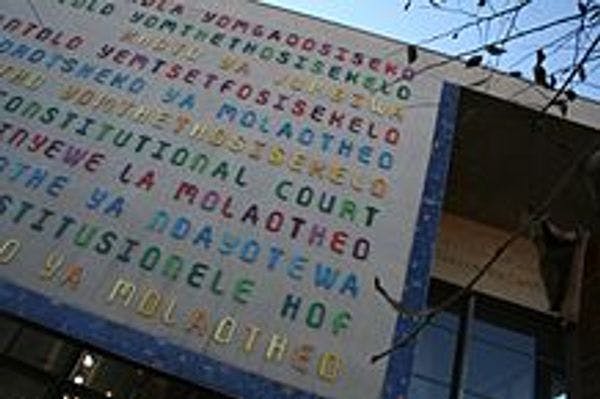CC Wikimedia Commons André-Pierre
The Constitutional Court of South Africa's ruling on cannabis - A tipping point on the tip of Africa
By Myrtle Clarke (Fields of Green for ALL)
Down here on the Southern tip of Africa we have been cultivating and trading in cannabis since the 16th century. Today we have an estimated 900,000 Cannabis farmers and 350,000 traditional healers who use this plant as medicine. Add millions of adult users, Rastafarians and hemp enthusiasts to the mix and you have a country that is inextricably bound to the good plant.
Fast forward to September 2018. In a ground-breaking move, the Constitutional Court of South Africa ruled that the prohibition of the personal use and cultivation of cannabis, by adults, in private spaces is unconstitutional (ruling available here). The court gave the government two years to amend the offending parts of the South African 1992 Drugs and Drug Trafficking Act.
Apartheid ended in 1994, with what is considered the most peaceful transition to democracy ever. Our ANC government has been in power for 24 years and has never, so far, considered ending what we call “the last apartheid law”. When we were arrested in our home in 2010, we could have paid our way out of the charges (South Africa is, by now, famous for its widespread corruption) or accepted a criminal conviction. However, we were so incensed at the treatment we received at the hands of the police that we decided to sue 7 government departments on charges of enacting unlawful laws. Our trial, dubbed “The Trial of the Plant” was part heard in August 2017, as the state and fundamentalist religious opposition filibustered us out of court time.
Running concurrently with the Trial Of The Plant was the case of Rastafarian lawyer Garreth Prince and the leader of the Dagga party, Jeremy Acton, in the Western Cape High Court. Their case overtook ours and we joined them as co-applicants in the Constitutional Court, bringing with us our expert evidence from The Trial of the Plant. This resulted in the landmark judgement which ensures that no South African can ever be prosecuted for personal use, possession or cultivation within private spaces.
In May 2019, South Africa faces a general election. The ANC government has a lot to answer for. Our economy has bottomed out due to widespread corruption and the “capture” of state-owned enterprises by nefarious forces of greed and incompetence. We eagerly await the formation of a parliamentary committee charged with fulfilling the Constitutional Court order, but do not expect this to happen until after the storm of the elections has subsided.
We eagerly await the formation of a parliamentary committee charged with fulfilling the Constitutional Court order, but do not expect this to happen until after the storm of the elections has subsided.
Since the beginning of our campaign we have known that you “can’t get what you want unless you know what you want”. We have been working on our “desired outcomes” for years and published a discussion document outlining our “Proposals for the Legal Regulation of Cannabis in South Africa” in March 2018. Our focus is on the informal economy, the unregulated market that so desperately needs a voice amidst the clamour of foreign corporate interests that have invaded our country looking for what’s in it for them.
Our focus is on the informal economy, the unregulated market that so desperately needs a voice amidst the clamour of foreign corporate interests that have invaded our country looking for what’s in it for them.
The role of our NGO, Fields of Green for ALL, is to help civil society find its voice in this confusing transition zone between prohibition and legal regulation. The Constitutional Court judgement did not allow for any trade in cannabis and this is the most important aspect of legal regulation in a country that desperately needs food on the table. It is for this reason that, since 2015, we have been attending as many international drug policy events as possible. International developments have certainly helped us along the way as we have the tangible examples of reform in countries like Portugal, Uruguay, Canada & some states in the USA to use as reference, even when some of these show us what NOT to do, as is the case with Canada, where regulations are at odds with basic human rights.
Our court case is not over. We have postponed the date until after the government’s deadline to rewrite the law by September 2020. If we don’t get what we want, we will resume our litigation. In the meantime, it is a race to compile everything we need to present to Parliament. This includes outlining exactly what we want the new law to look like as well as the “substantive law” – how the law will roll out supported by regulations that are in line with our Constitution and our Bill of Rights, both cornerstones of our democracy. We figure that the politicians will be receptive of the fact that civil society has done their work for them!
It is essential that the end to cannabis prohibition is handled with the utmost diligence. One of the most pervasive arguments from prohibitionists is that cannabis is a gateway drug. We like to turn that argument on its head by saying that, yes, cannabis is the gateway - to more sustainable drug policy as a whole. If we do this right, we have a chance to ensure that South Africa offers mountains of evidence to the rest of the world, and to put sustainability and human rights at the centre of broader drug policy reform.
